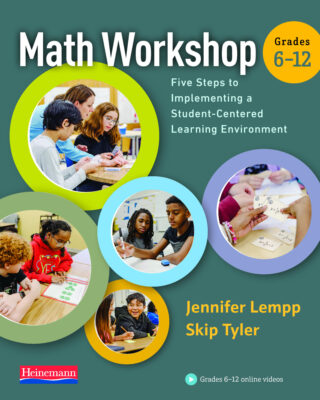
The current reality in education is that as teachers we have a lot to teach in a short period of time. It is not feasible to give up large chunks of math instruction in order to prepare students for math workshop. Rather, minilessons are designed to complement your math instruction.
Minilesson Overview
In this lesson, students consider the importance of active listening and practice being active listeners.
Many times we think we are listening, but our minds are wandering—we are thinking about and preparing our responses, thinking about questions we have, or thinking about how a comment applies to us. Being an active listener does not come naturally or easily; it is something that we have to work on and practice.
What is an “active listener”? An active listener is one who listens to another speaker while suspending judgment. Active listeners are not thinking about themselves, their comments, their work, their answers, or their questions. Active listeners are completely engaged in hearing the speaker and making sure to not be distracted.
Students learn through sharing their ideas, listening to and critiquing the ideas of others, and by having others critique their approaches to solving problems. —Margaret S. Smith and Mary Kay Stein, authors of 5 Practices for Orchestrating Productive Mathematics Discussions, Second Edition (2018) |
Directions
You have probably all heard how important it is to listen in school. But many of you may think that only applies when you have to listen to the teacher. It is important to listen to what I say; however, it is equally important to listen to each other. Each of you has so many great ideas and wonderful questions. We can learn a lot from each other. But that means that when one of you is talking, everyone in the room is listening to what they are saying, not thinking about their own questions or about what they would like to share. We are going to practice this today, and we are going to work on this every single day in our classroom and in math workshop. Let’s practice with this topic:
Would someone be willing to share a favorite way to spend a weekend?
Select one student to share. Remind the other students that their job is to be an active listener. As the student finishes her description, use talk moves to ensure that the rest of the students have listened to what their classmate said. You might say:
- Turn and talk to a shoulder partner about what _____ said about how she likes to spend the weekend.
- Who can repeat what _____ said about how she likes to spend the weekend?
- Tell me how _____ likes to spend the weekend, using your own words.
At this point, help students understand that this is not a time to make connections to how they spend the weekend or to discuss if they do the same thing. A student may say that he likes to take his dog to the dog park, and the next thing you know, fifteen hands are going up.
- “I have a dog!”
- “I’d rather spend time with my friends.”
- “I’ll go to the park but will be playing basketball.”
- “Whenever I go to the park, my little sister follows me around everywhere.”
As we all know, this can go on and on and completely derail a lesson. Should this happen, point out that these are ways to connect to what the speaker said, but that doing this is actually an example of not actively listening.
Ask students to reflect on why it is important to listen to one another and how they feel when someone does not listen to them. Ask students to share out ways that they will focus on being an active listener.



